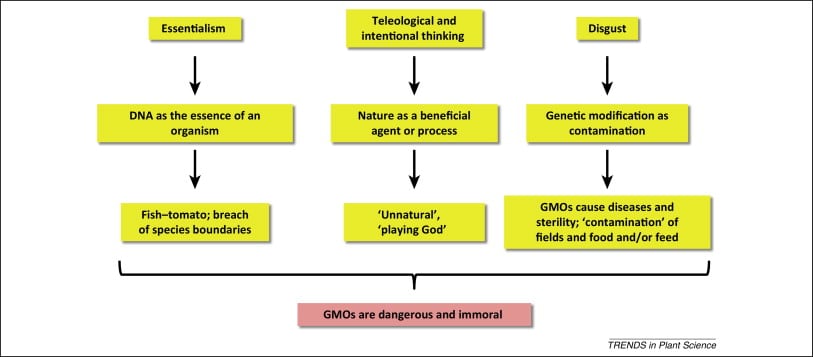A team of Belgian philosophers and plant scientists looked to cognitive science for reasons why anti-GMO sentiment remains strong, despite a growing body of evidence that GM crops do not pose specific health or environmental risks, and may benefit local farmers.
“The discrepancy between public opinion and the scientific evidence requires an explanation,” they wrote. “We argue that intuitive expectations about the world render the human mind vulnerable to particular misrepresentations of GMOs.”
Legitimate concerns…on a case-by-case basis
The paper’s authors acknowledge that there are some legitimate concerns about particular GM crops and their uses, but they underline that these tend to be unrelated to the technology itself and need to be assessed on a case-by-case basis.
“For instance, herbicide resistance in weeds has indeed become a problem in areas such as the USA and Argentina where farmers have over-relied on a single herbicide-resistant crop that was tolerant to glyphosate. However, these concerns are typically unrelated to the technology of genetic modification, and instead result from unsound agricultural practices and policy that also can cause problems in the case of ‘conventional’ crops,” they wrote.
Disgust, unnaturalness, essentialism
They argue that the intuitive mind is not well-equipped to deal with questions like ‘how does it work’ or ‘is it dangerous’ – and most people are not predisposed to spending significant time in understanding complex technologies, so their intuitions win out. These are based on several assumptions and superstitions, including the idea that natural organisms have an immutable core or essence that should not be tampered with, or the idea that scientists should not ‘play God’.
"This reasoning of course conflicts with evolutionary theory – the idea that in evolution one species can change into another,” said lead author Stefaan Blancke, a philosopher at Ghent University.
Other anti-GMO intuitions are based on moral objections and emotions, triggered by stories of multinationals chaining small producers to using their seeds, for example. The paper’s authors added that while such claims were important to investigate, immoral business practices were not confined to a specific technology.
"The popularity and typical features of the opposition to GMOs can be explained in terms of underlying cognitive processes. Anti-GMO messages strongly appeal to particular intuitions and emotions,” said Blancke.
“Negative representations of GMOs – for instance, like claims that GMOs cause diseases and contaminate the environment – tap into our feelings of disgust and this sticks to the mind. These emotions are very difficult to counter, in particular because the science of GMOs is complex to communicate."
However

Source: Trends in Plant Science
doi:10.1016/j.tplants.2015.03.011
“Fatal attraction: the intuitive appeal of GMO opposition”
Authors: Stefaan Blancke, Frank Van Breusegem, Geert De Jaeger, Johan Braeckman, Marc Van Montagu
